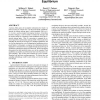Free Online Productivity Tools
i2Speak
i2Symbol
i2OCR
iTex2Img
iWeb2Print
iWeb2Shot
i2Type
iPdf2Split
iPdf2Merge
i2Bopomofo
i2Arabic
i2Style
i2Image
i2PDF
iLatex2Rtf
Sci2ools
AMEC
2003
Springer
2003
Springer
Choosing Samples to Compute Heuristic-Strategy Nash Equilibrium
Auctions define games of incomplete information for which it is often too hard to compute the exact Bayesian-Nash equilibrium. Instead, the infinite strategy space is often populated with heuristic strategies, such as myopic best-response to prices. Given these heuristic strategies, it can be useful to evaluate the strategies and the auction design by computing a Nash equilibrium across the restricted strategy space. First, it is necessary to compute the expected payoff for each heuristic strategy profile. This step involves sampling the auction and averaging over multiple simulations, and its cost can dominate the cost of computing the equilibrium given a payoff matrix. In this paper, we propose two information theoretic approaches to determine the next sample through an interleaving of equilibrium calculations and payoff refinement. Initial experiments demonstrate that both methods reduce error in the computed Nash equilibrium as samples are performed at faster rates than naive ...
| Added | 06 Jul 2010 |
| Updated | 06 Jul 2010 |
| Type | Conference |
| Year | 2003 |
| Where | AMEC |
| Authors | William E. Walsh, David C. Parkes, Rajarshi Das |
Comments (0)

